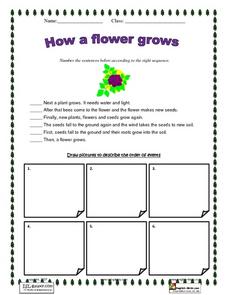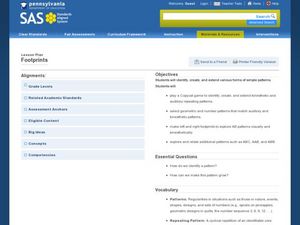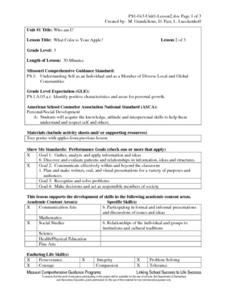Curated OER
How a Flower Grows
English Language Learners demonstrate their ability to sequence the steps in a process. After reading six sentences that describe how a flower grows, learners identify the right sequence and illustrate the steps. An answer key is provided.
Curated OER
Representing and Extending Patterns
Students explore repeating and growing patterns. In this patterns lesson, students describe patterns, explore changing patterns and match patterns. Students participate in online activities and read books that show patterns in...
Population Connection
Where Do We Grow from Here?
Did you know that the population is expected to grow to 11 billion by 2100? The resource serves final installment in a six-part series on the global population and its effects. Scholars interpret data from the United Nations about the...
Curated OER
Footprints
Students explore patterns. In this patterns geometry lesson, students identify and extend patterns including body parts, movement, geometric shapes, noises, and footprints. Students create and share an original pattern.
Curated OER
What's the Best Deal?
Students explore number sense by solving consumer math problems. In this pattern identification lesson, students analyze a list of numerical and geometric patterns while predicting the future outcome. Students utilize inference skills to...
Novelinks
The Color of Water: Concept Analysis
Considering using James McBride's autobiography/memoir The Color of Water with your class? Check out this seven-page informational packet that includes background information on McBride, the organization pattern of the book, and...
Curated OER
Homophones and Rhyming Words
First graders explore homophones. For this spelling pattern lesson, 1st graders are led through a discussion on homophones and words that rhyme with homophones. The teacher leads the class in sorting these rhyming words based upon their...
Curated OER
How Does Your Garden Grow?
Students construct and maintain a school garden. In this gardening lesson, students plan the construction of the garden by writing letters to local businesses asking for supplies and materials; students build the garden using their math...
Curated OER
Reading Recall
Second graders review the vowe-consonant-e pattern in association with reading fluently. After identifying the changes made to a phoneme when the letter e is added at the end of the word, 2nd graders practice reading a phonetically...
Curated OER
Logical Sequence
Students examine logical and illogical sequences in writing. They identify illogical sequences of sentences in a letter. Students retell short stories using a logical sequence and students place sentences in logical order.
Curated OER
Cause and Effect: Light Clusters and Geography
After viewing a map of lights at night over a variety of geographic formations, young topographers connect the location of light clusters to geographic features that encourage human settlement. They list causes and effects of large...
Curated OER
Canada and its Trading Partners
Students identify the relationship between Canada and its trading partners. They use two data sources, Canadian Statistics and E-STAT, on the Statistics Canada website to explore the growing importance of trade in general.
Curated OER
Word Families
First graders listen as they are read a book containing exmaples of word families, they listen for rhyming words. They focus on word families, words that have rhyming sounds and share the same spelling patterns. Pupils work in small...
Curated OER
Poetry of Abraham Lincoln
Fourth graders analyze Abraham Lincoln's poems "The Bear Hunt" and "My Childhood's Home" for word choice and deeper inquiry into the vocabulary he uses to convey emotion. They identify rhyming words and patterns in these poems. ...
Curated OER
What Color Is Your Apple?
Third graders spend time identifying the characteristics they have and ones they would like to develop for their own personal growth. As a class, they brainstorm ways they can tell they are growing up or being mature. Individually, they...
Curated OER
I Grow
Students describe factors that influence relationships with family and friends. They write a book about themselves using personal knowledge.
Curated OER
Logs of Straw: Dendocronology
Students investigate the age of trees by analyzing tree rings. In this dendocronology lesson plan, students examine sample images of tree rings and identify their age by the amount of rings. Students complete a chart...
Curated OER
Time and Cycles - Dendrochronology
Students investigate the lives of trees by examining ring cycles. For this plant life lesson, students identify the field of study known as dendrochronology and discover its history. Students investigate a simulated tree ring...
Curated OER
Spelling Strategies for Success
Students identify the meaning of the suffix "er" in given words and sort according to meaning. Students pair up for proofing of work, checking for correct sorting of words in categories of: no suffix, suffix that means "more," and...
Curated OER
Japanese Poetry: Tanka? You're Welcome!
Students analyze Japanese tanka poetry. In this Japanese poetry lesson, students identify analyze the structure of tanka poetry. Students complete the activities at the given links for the lesson and compose two tanka poems.
Curated OER
All About Me: My Senses
Students explore the world around them and identify their five senses and the parts of their bodies that are associated with each sense.
Curated OER
Beautiful Bovine
Students compare and contrast a human body to a cow. Using a diagram, they label and identify the functions of the cow's numerous parts. In groups, they create a Venn Diagram to compare the various types of cows with one another. They...
Curated OER
I Think I Forgot Something!
Students examine human health by reading a children's book in class. In this breakfast lesson, students identify the importance of starting the day with a good, nutritious meal. Students read the book I Think I Forgot Something and...
Curated OER
Song Writing
In this music worksheet, students identify specific tips for composing a song. They use strophic form where each verse has the same melody. Students also select a chord sequence and use cadences at the end of each phrase and modulations...























